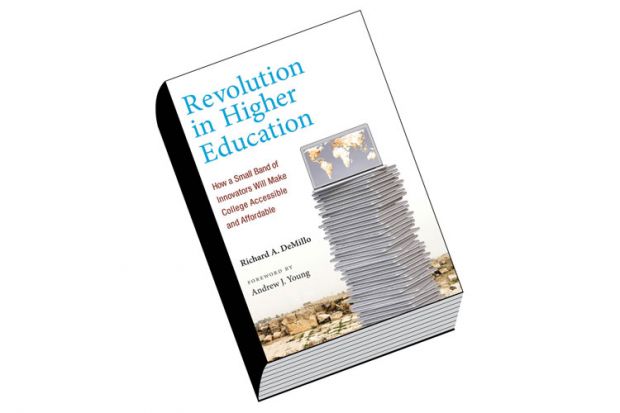In Revolution in Higher Education, Richard DeMillo sets out his vision for “a new social contract to democratize education”. He argues that our current system, “designed a hundred years ago when relatively few people attended college”, is financially unsustainable and reproduces social inequalities. In contrast, technological change, most specifically in the form of massive open online courses, could enable anyone, anywhere, and whatever their income, to access an education.
A computer scientist and director of the Center for 21st Century Universities at Georgia Institute of Technology in the US, DeMillo argues that universities spend tuition fee income on raising institutional prestige and enhancing the student experience in ways that have nothing to do with learning and teaching. “Largely meaningless” ranking mechanisms further encourage competitive spending. Despite paying extortionate tuition fees, DeMillo argues, “students graduate from college with grade-inflated degrees”. He points to “a string of highly critical studies” that call into question the success of universities in teaching students “how to think critically, reason quantitatively, and communicate effectively”. These are well-observed criticisms, and Revolution in Higher Education offers readers a potential technological solution.
DeMillo then goes on to recall the development of some of the most popular online learning platforms in use today, via the experiences of the key people and institutions that brought them into existence, and this exhaustive history will no doubt serve as a useful resource for future researchers in this area. He is an engaging narrator and it is hard not to get swept up in his obvious enthusiasm for the story he has to tell. At times, however, this evangelism leads to hyperbole. Since 2012 – the “Magic Year”, as DeMillo describes it – higher education is, apparently, being “remade before our eyes” as events “once put in motion, cannot be recalled”.
The author’s “spiritual conversion” makes for a gripping story, but it does not put him in an objective position to evaluate the impact of online learning. His desire to replace traditional universities with Moocs is premised upon several contestable notions. Perhaps most provocative is DeMillo’s concept of learning. Learning begins, he tells us, “deep within the brain, where a continual cycle of neurotransmitter production and reinforcement literally rewires neurons as small chunks of learned information move from short to long term memory”. He goes on to claim that “the important neurotransmitters involved in learning include the chemicals acetylcholine, dopamine, and serotonin”.
DeMillo’s conviction that learning is just brain-based memorisation and demonstration of competence makes him scathing of much that currently occurs within universities. Lectures, he tells us, are “a waste of time” and “a live instructor has no intrinsic advantage when it comes to teaching”. While at the moment “a single professor and a half-dozen teaching assistants might be able to teach a thousand students”, DeMillo longs for the day when “five teams like this can teach five hundred thousand students”.
Most university lecturers will be convinced that they are teaching students, not disembodied brains. Many see their role as encouraging a deep understanding of a subject leading to the further pursuit of knowledge in a particular area, rather than peddling information and skills. This involves far more than triggering the release of a few chemicals. DeMillo offers no sense of education as being about anything other than competencies demonstrated, tests passed and certificates gained; all designed to bring about social mobility through employment. As a result, the “revolution” he longs for is quite explicitly “an assault on the Ivory Tower – and its noblest ideas like scholarship, tenure, and academic freedom – that must be defended at all costs by holy warriors”.
Despite DeMillo’s relentless enthusiasm for Moocs and his obvious desire to promote social justice, Revolution in Higher Education makes for a depressing read. There is no sense of excitement about the intellectually stimulating and endlessly fascinating knowledge students could gain access to. DeMillo betrays this philistinism when he exclaims that “it is hard to imagine what intrinsic motivation human beings might have to learn music or philosophy”. His revolution reduces knowledge to baseless snippets of information and students to automatons. If Moocs do come to transform the higher education landscape, some students will no doubt still find a way to access rigorous academic learning. The most disadvantaged in society will again face an education that classifies them according to their biology. Yesterday’s eugenicists have been replaced by “revolutionaries” determined to reduce learning to an online, chemically induced connection of brain synapses.
Joanna Williams is director of the Centre for the Study of Higher Education, University of Kent, and education editor at Spiked.
Revolution in Higher Education: How a Small Band of Innovators Will Make College Accessible and Affordable
By Richard A. DeMillo
MIT Press, 360pp, £20.95
ISBN 9780262029643 and 2331272 (e-book)
Published 23 October 2015




